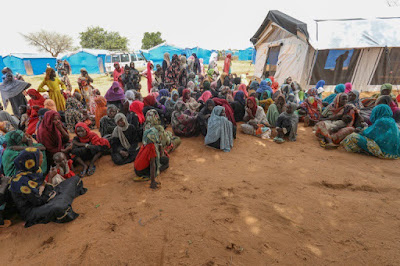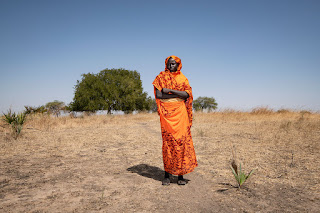- “People are tired. Corruption is the medicine of the day.”
- The last time Kiir and Machar clashed, an estimated 380,000 people perished and nearly two million were displaced in a wave of terror and famine which subsumed the country from December 2013 to October 2018.
- Both government and opposition forces “intentionally targeted targeted civilians, often on the basis of ethnicity”, reported Amnesty International in a detailed 2018 study of the conflict.
- While many were killed by gunfire, others were “burned alive in their homes, hung from trees and rafters, or run over with armoured vehicles”. Thousands more were subjected to “rape, gang rape, sexual slavery, sexual mutilation, torture, castration and forced nudity”.
- It was the worst humanitarian crisis in Africa since the 1994 genocide in Rwanda. Read more below.
South Sudan: a country on its knees
Report from The Telegraph.co.uk
Dated week ending 22 February 2020
Millions of lives at stake as ‘unity government’ announced
After a devastating civil war, life in South Sudan hangs by a thread. Can the world's newest nation find a path to unity?
There are few places left on earth where mobile phone use is not ubiquitous, but South Sudan is one of them.
Yet in this scarcely developed nation of tukul huts and herdsman there is hardly a family among its 11 million population who is not anxiously awaiting news from the capital Juba.
This Saturday, February 22, is the deadline for President Salva Kiir and his former deputy turned rebel leader Riek Machar to stand down their rival armies and form a “unity government”.
It’s the long awaited centrepiece of a fragile peace accord which paused the country’s five year civil war 16 months ago. Only if the two self-styled ‘big men’ sign is the peace likely to hold.
With the US threatening sanctions and fatigued aid agencies saying they may pull out, the stakes could hardly be higher.
Much of South Sudan's population of 11 million is anxiously awaiting the outcome of peace talks in Juba
With just 48 hours to go, there were positive noises. "We had a meeting with the president on the outstanding issues. We have agreed to form the government on 22 February”, Machar said on Thursday.
Only a few dare to dream that a deal this weekend would set South Sudan, the world’s newest but fourth least developed nation, on a path to modernity.
A country the size of France, it has only 186 miles (300 km) of paved road and 90 per cent of its population are without access to electricity or clean water. An estimated 60 per cent rely on food dropped by World Food Programme planes and helicopters to survive.
The best that can be hoped for, say observers, is that a deal will avert fresh military calamity.
“If they can shake hands it would help cement the peace deal and allow the UN and aid organisations like us to keep things ticking over,” said Geoff Andrews, country director of Medair, a Swiss NGO which has been in the country since 1992 and runs its biggest emergency aid programme.
“We talk about failed states but this is a non-functioning state”, says another NGO. “The things that define a state, its institutions, are virtually non-existent”
Two-year-old Ibrahim weighed only a third of what he should when he arrived at the clinic
He is just one of the severely malnourished children receiving treatment from Swiss NGO Medair
Franco Duoth Diu, deputy governor of Southern Liech State which saw some of the most intense fighting, says that unless a deal is done change will be forced on the rival leaders.
“These two men will be looking at something very different unless they can agree,” he warns. “The pressure is from the international community but also the community here.”
“People are tired. Corruption is the medicine of the day.”
What everyone fears, and many are braced for, is no deal at all. The last time Kiir and Machar clashed, an estimated 380,000 people perished and nearly two million were displaced in a wave of terror and famine which subsumed the country from December 2013 to October 2018.
Both government and opposition forces “intentionally targeted targeted civilians, often on the basis of ethnicity”, reported Amnesty International in a detailed 2018 study of the conflict.
While many were killed by gunfire, others were “burned alive in their homes, hung from trees and rafters, or run over with armoured vehicles”. Thousands more were subjected to “rape, gang rape, sexual slavery, sexual mutilation, torture, castration and forced nudity”.
It was the worst humanitarian crisis in Africa since the 1994 genocide in Rwanda.
Across the country, 99 under-fives die per 1,000 births
A mother stands at the grave of her two-year-old child, who died from diarrhoea
A herder with malnourished cattle
This month the Telegraph travelled extensively in South Sudan to document the humanitarian relief effort in the run up to Saturday’s deadline.
It’s undoubtedly a country on its knees, aptly described by one commentator as a “kleptocracy gone insolvent”, but also a place full of youthful ambition, its average age just 18.
In a tarpaulin-clad clinic run by Medair on the outskirts of Renk, a market town in the north of the country, dozens of pregnant young women queue for check ups.
They have been tempted in by a volunteer network of local women who preach the benefits of antenatal checks and good hygiene in a bid to cut child deaths and deaths in childbirth; a sort of Avon for health which reaches 10 or more walking or “footing” hours into the bush.
The country’s maternal mortality rate at 789 deaths per 100,000 live births, is the fifth highest in the world - 87 times higher than in the UK where the corresponding figure is just nine.
Macca, a 30 year old mother of seven, is six months pregnant and only half jokes she would like 15 children in total. “I’m replacing the ones lost in the war”, she says, “I’m working for my country.”
She is not unusual. Women in South Sudan have an average of nearly five children, largely because the ruthless economics of the place demand it.
“I want to have 10 children so I have enough if some die,” says Amel, a 23-year-old mother of two. “Without children who will look after us?”
A few metres from the antenatal clinic, the toll of infant mortality is all too evident. In a “stabilisation” room Medair staff are busy reviving distressingly listless toddlers, several of whom have been brought in only a hours away from death.
Across the country, 99 under-fives die per 1,000 births, compared to just four in the UK. In Renk where acute childhood malnutrition is running at 32 per cent, the odds are even worse.
Since the end of 2013, conflict has cost almost 400,000 lives and left six million people, of a population of 11 million, desperately hungry
“Malaria, diarrhea or pneumonia are what kills most but it’s because they are malnourished that they are so vulnerable,” says Jimmy Freazer who runs the unit.
Two-year-old Ibrahim is just a third of his proper weight and has all the signs of a child on the brink. His feet and stomach are swollen, his mouth is white with thrush and his eyes are glazed and unresponsive. His baby sister is almost as big as him having won the battle for his mother’s breast.
“The sudden weaning of children can be a problem,” says Freazer, “Too many stop breastfeeding when they become pregnant. They think they need to save it for the next one.”
At the other end of room, Achol, a little girl of just eight months, is considerably worse. She has a drip in her arm and otherwise still, her tiny chest is heaving.
Her mother, Nayana, is exhausted from trying to stem a tide of vomit and diarrhoea. The fear in her eyes is so intense that you want to duck her gaze. We leave her - wrongly as it turns out - to what we assume is her infant’s last few hours.
Sudanese civilians collect water form the Nile, in Renk district. Dirty water is a primary cause of disease
When South Sudan won independence from the north in 2011, its people made the fatal mistake of assuming that with independence comes freedom.
The new government, while promising democracy, adopted the oppressive security infrastructure of the north and set about dividing what little wealth the country had between themselves.
There have yet to be elections and the International Monetary Fund calculates that real incomes in South Sudan today are about 70 per cent lower than in 2011.
Despite taking over about 75 per cent of old Sudan’s oil reserves, the vast majority of the population still relies on subsistence agriculture and gathers charcoal for fuel.
Worse, given the country’s reliance on food aid, the only large scale farms are said to be owned by government acolytes and export much of what they produce abroad.
A boy plays in the Nile's dirty water
An abandoned ambulance at the military hospital in Renk
A boy with his donkey, carrying water to sell
The Nile runs through the centre of the country and, with modest investment, could be used to irrigate millions of hectares of fertile scrubland.
But the only machines evident are old Blackstone pumps made in Stamford, England, a decaying relic of the time Britain held sway here. Even then much of the produce was exported.
“This should be the food basket of the region”, an agricultural adviser with the International Red Cross says. “On the up side, what is grown is organic and the land retains its potential.”
As the deadline for the formation of a unity government looms, rebels in t-shirts and sandals marched alongside government troops outside Juba earlier this week in a display meant to reassure international monitors that progress is being made.
Then on Thursday, Machar said he had agreed to form a unity government by Saturday's deadline. Kiir confirmed the agreement, adding that he will appoint Machar as first vice president on Friday.
"We are going to discuss the security arrangement for the protection of all opposition forces and members," Kiir added.
Eight-month-old Achol with her mother. The malnourished infant is being treated for vomiting and diarrhoea
Just five days after she was admitted to the clinic, Achol is looking much better
There remain two key obstacles to a lasting deal, say analysts. The two rival armies need to be merged into a single force and control over the country’s oil revenues need to be split equitably, ensuring a balance of power.
While the big men quarrel and the nation waits, basic medical science and good care were working their magic in Medair’s health clinic.
Only five days after her arrival, little Achol was sitting up, putting on weight and playing with her delighted mother.
“I would like to see a point in South Sudan where girls are more likely to complete their education than die in childbirth,” said Natalie Page, Medair’s senior health adviser in South Sudan.
Perhaps, just perhaps, Achol will live to see that dream become a reality if a deal is done this weekend.

.jpeg)

.jpeg)
.jpeg)














